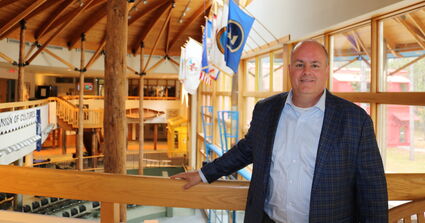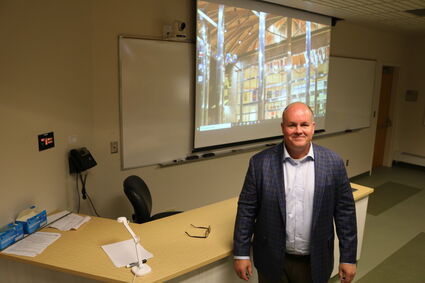Former chief finds new way to serve
October 28, 2022

Brady Slater
Mike Tusken stands in Fond du Lac Tribal and Community College in Cloquet, where he's taken over as coordinator of the law enforcement program after retiring as the police chief in Duluth in August.
Mike Tusken grows into leadership role at college
There were days as Duluth police chief when Mike Tusken was exhausted, yet still found himself driving to Cloquet to teach a three-hour night class on community policing.
"You're going 150 miles per hour in that job and I was coming here dreading it, because I was out of gas," Tusken said. "But when you're doing education, you've got people who are anxious and excited about getting into this field. I got energy from that. I left here invigorated."
Tusken retired from the Duluth Police Department in August and immediately transitioned into a new role at Fond du Lac Tribal and Community College. He's the school's law enforcement program coordinator, diving full-time into academia on the heels of his career serving Duluth.
The Pine Knot met with Tusken earlier this month to discuss his new role, what he hopes to bring to the work, and how program enrollment is bouncing back after hitting a low point during the Covid-19 pandemic and in the aftermath of the George Floyd killing by Minneapolis police in 2020.
"I went from one chapter on mission, values and ethics, and I've made it a three-week part of the course," Tusken said, still teaching his community policing class. "It's so important for them to realize that if they're not making ethical decisions, not only are they hurting their own careers, they will take down the entire rest of the profession."
Bolstering the ranks
Fond du Lac graduated a program-low 15 prospective law enforcement officers last spring - down from highs between 60 and 70 graduates. This year, there are 62 students in the school's introductory criminal justice course - a fixture for future probation and conservation officers, in addition to law enforcement students. There are also 30 students on track to graduate and take part in the law enforcement program's final piece, its May skills training.
"This fall we've had higher numbers in our introductory courses, and that gives us an indication our graduating classes are going to be higher," said Cassandra Nicholson, administrative assistant in the law enforcement and nursing programs.
"It's slow progress, but it's progress."
Tusken realizes not every graduate will enter a six-week academy, as new officers do when they're hired in Duluth. Most departments in the state have fewer than 20 officers, Tusken said. So, before new hires walk into a small department, he wants them to be "Day One ready."
"The employer may not have the wherewithal to give you those skills later on," Tusken said. "You should have those skills and abilities when you walk out the door here."
Experienced staff
One of the features of a Fond du Lac law enforcement education is that, in addition to Tusken, it presents instruction from three other former police chiefs: Chuck LeGess (Superior), Scott Lyons (Duluth), and Wade Lamirande (Cloquet). Adjunct faculty also include a state trooper, former Federal Bureau of Investigations agent, and Joel Olejnicak, Duluth's lead trainer and coordinator of the college's summer skills training.
"I give credit to any law enforcement officers who choose to stay in the game and contribute to the success of our profession," Lamirande said. "So many people are burnt out. They retire and go weld or do construction, something different."
Lamirande exited the law enforcement coordinator post after eight years this summer, ceding the job to Tusken. Before them, Lyons ran the program for 12 years.
As Tusken transitions to full-time days on the Cloquet campus, he's been met with a cadre of support. Lamirande explained the college is filled with "serious, super-smart and dedicated people," and that one of his own challenges was to rise to meet the rigors of academia.
"It's not a retirement gig," Lamirande said. "It's important to find the right person who understands that, and Mike does."
Lamirande said Tusken brings a "great attitude," and has not been afraid to ask questions.
Time to learn
For his part, Tusken is learning as he goes. Every student comes into the program at a different starting point, he said, and it's been his job to bring them on where they are, whether a high school graduate, someone with college experience, or someone transitioning from another field. Graduation requires 68 credits, including classes such as criminal procedure and evidence, use of force, patrol procedures, and state statute and traffic law.
"What's the path forward for each individual student to get to that goal of being able to take the (Police Officer Selection Test)?" Tusken said, reciting one of his primary tasks.
In addition to learning on the job, Tusken is also bringing his own experience to it. He's a strong advocate of community policing, the notion that fostering ties with people who know their neighborhoods and towns builds a stronger safety net for everyone.
"We're providing a service in partnership and collaboration with our community," Tusken said. "That's a whole different mindset than when I started in 1992, when it was, 'Hey, we're the cops, and you're not.'"
To that end, he wants to bring more experiential training to the Fond du Lac program, exposing prospective officers to other community supports such as county social workers, drug abuse intervention programs, and resources for poverty - a driver of many social ills, he said.
"You're only as effective as a police officer as a problem solver," Tusken said.
Both Tusken and Lamirande talked about policing as a "noble profession."
It's something the program tries to infuse into its teachings.
"There's not a profession in our world, in my opinion, that can do more good for more people," Tusken said. "There are opportunities every day to make an impact in people's lives. We have to hire people who are passionate about that."








